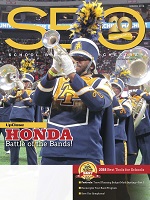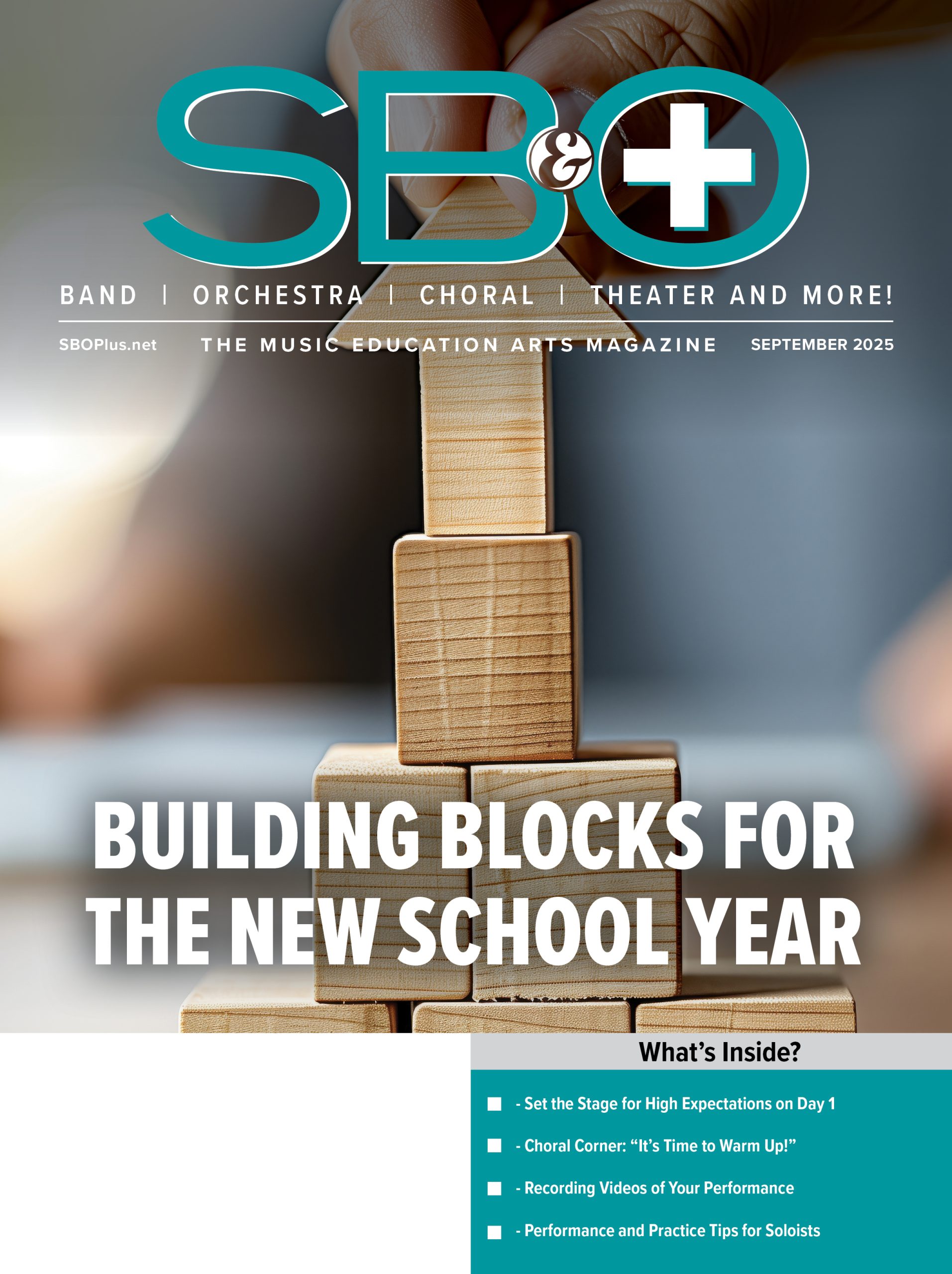This article is an excerpt from the book “Teaching Music at the Secondary Level: a Pedagogical and Curricular Guide,” by Dr. Steven Porter and Joel Smales, published by Phantom Publications in association with Players Press and distributed by Empire Publishing Service, P.O. Box 1344, Studio City, CA 91614.
By Dr. Steven Porter and Joel Smales
Let’s make the assumption that you are beginning the teaching of your performing group program either because it is your first teaching assignment or because it is your first year in a district to which you have just transferred. What follows is a guide to help you organize your program successfully. It occurs in the order in which things should be done. Hopefully, you have not been hired at the last minute, and you have at least the summer months to prepare for the start of the school year in September.
People to Seek Out
While you have time to get organized, there are a few people you ought to meet in order to gather information necessary for your program. The first people on your list should be the building and department administrators to whom you will be responsible. They will be able to tell you the policies that have been established for your program as well as the expectations your program must fulfill. They will also be able to tell you where your own innovation can be applied. Exactly what information you get will depend on your ability to be specific in your questions.
After speaking to your administrators, if it is at all possible, try to talk with the teacher whom you are replacing. With allowances for the personal opinions that color all answers, the out-going teacher can give you a wealth of data on every aspect of your program from administration to funding. Most teachers are happy to share what they know.
Next on the list, if they are available, are students who will be returning to your program, particularly officers of your performing group. They will complement the data you get from the adult professionals, and they may be far less constrained in supplying that data. If you can meet with some of their parents, so much the better.
Finally, it would be wise to meet with the custodial and secretarial staff with whom you will work. Their day-in, day-out knowledge of things will be worth their weight in gold to you. Supplies, keys, storage, names of district personnel, and much more can all be obtained by support staff. Your relationship with these people will be fundamental to your success.
Things to Do Before School Begins
After getting to know the people with whom you will work most closely, you will need to lay the groundwork for the arrival of your students in the fall. The items below represent some of the more important things to do.
Inspect and assess your physical plant. The room in which you will rehearse, practice facilities, the stage and hall where your performances will occur, storage areas, music library, instrument inventory, equipment (music stands, chairs, risers, pit lights, conductor’s podium, pianos, etc.) – all these will affect the decisions you make about your chorus, band or orchestra. Getting to know about these things at this stage of your work will save you a headache later on. To give you just one obvious example, how you arrange a chorus during a performance will fundamentally depend on the number and condition of the risers available to you. Fail to assess that and you play “Russian Roulette” with whatever physical scheme you devise, no matter how brilliant.
Get your exact schedule and duties. In order to plan your rehearsals and performances, you will need to know not only your daily schedule, but all of the concerts, parades, sporting events, festivals, musical theatre dates and special occasions (such as National Honor Society induction, feeder concerts, graduation, etc.) for which you are expected to supply music. The worst thing that can happen to a performing group is to be unprepared to play. The more advance notice, the better able you will be to meet the demands placed upon you and your students.
Prepare your room. Music teachers live in their rooms, and the proper organization of them is a tremendous aid in the process of making music. Try to clean it, decorate it and organize it to meet your personal rehearsal needs, storage requirements, and aesthetic tastes. Whatever else will happen in your room, it will be the principal rehearsal space you have. You cannot at this point be sure of the exact student population you will face (though your administration can certainly provide you with your fall enrollment), but try to envision your group within the confines of your room. That will help you prepare it now and set up your seating plan in the fall when you actually meet your students.
Decide on the organization of your program. The very least a performance program contains is a comprehensive performing group consisting of all the students enrolled. That, however, is not, in our experience, sufficient for a really excellent secondary program. The very heterogeneity of public schools will present you with a wide variety of students – wide in ability and wide in the desire to achieve. Having only one general-level group will usually not stimulate those students of greater ability and greater desire. We therefore recommend that even on the junior-high or middle school level, you run one general-level and one auditioned, higher-level performing group.
Performing Groups
The nature and size of the auditioned group matters less than that it exists. For most schools, the size of the school will probably permit a pretty comprehensive select group. It is therefore quite possible to have a band and wind ensemble, a chorus and select choir, a string orchestra and chamber ensemble. Even if your population does not permit a terribly large select group, you can still have advanced ensembles such as a brass quintet, madrigal choir or string quartet. The important thing is to provide an outlet for your best players and an incentive for younger, weaker players.
On the middle school/junior high level, we recommend one general performing group and one select performing group. On the high school level, the sky is the limit. Our program at the Rod Serling School of Fine Arts can give you an idea of what is possible. Our band program has a concert band, wind ensemble, jazz ensemble, brass choir, saxophone ensemble, clarinet choir, flute choir, and several percussion ensembles, including a marimba band and steel drum band. In addition, we field a marching band that participates in parades, football games and competitions. Finally, we have a small pep band for basketball games.
Our choral program has a mixed chorus, concert choir, women’s chorus, swing choir, holiday choir (which does most of our Christmas and community outreach performing), and occasionally a Schola Cantorum when we have enough students for a truly exceptional group.
Our string program, which, like most high school string programs, tends to be the smallest, has a full chamber ensemble, a string quartet and string trio. We also have in our region a youth symphony orchestra auditioned from the student population of the entire region (about 15 school districts) that is the premiere public school orchestral group for each high school in the county. (Students from private schools also participate.)
The comprehensiveness of your program will be up to you to decide, of course, but we mention ours to give you an idea of how many performing groups are possible within any given program.
This is only a sampling of the many wonderful opportunities and adventures that await you in your teaching career. Be patient, ask questions, be yourself and enjoy teaching. Your students and their parents will be thanking you for years to come!
Joel Smales is director of bands at Binghamton High School’s Rod Serling School of Fine Arts in Binghamton, N.Y., where he conducts two concert bands, two jazz ensembles, a marimba band and steel drum band. He holds music degrees from the Crane School of Music and Binghamton University. As a performer, Smales is active in the upstate New York region, where he performs with the Binghamton Philharmonic Orchestra, leads his own percussion quartet and plays drum set and jazz vibes regularly in the area. He has performed on over 30 CDs encompassing jazz, pop, country, folk, audio books, as well as for television and commercials. His published works include percussion solos, ensembles, method books and a recently completed text, “Teaching Music at the Secondary Level,” all published by Phantom Publications, Empire Music Company.
Steven Porter, BS, MA, Ph.D., is Coordinator of Musical Theatre at Mercyhurst College in Erie, Penn. He has authored more than 15 books on topics ranging from music theory and secondary music education to musical theatre, films and general education. He has more than 100 musical works for chorus, solo voice and stage currently in print. His teaching experience spans from elementary to the college level.




























